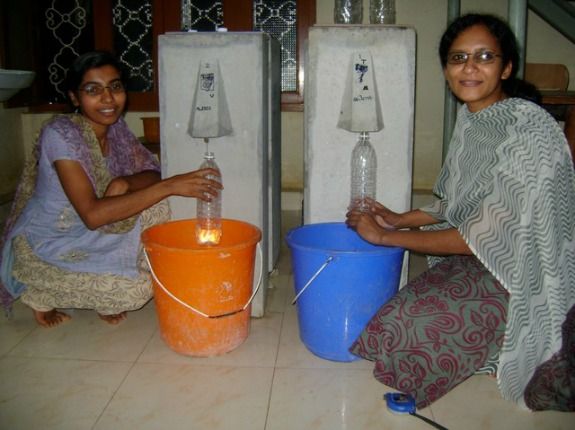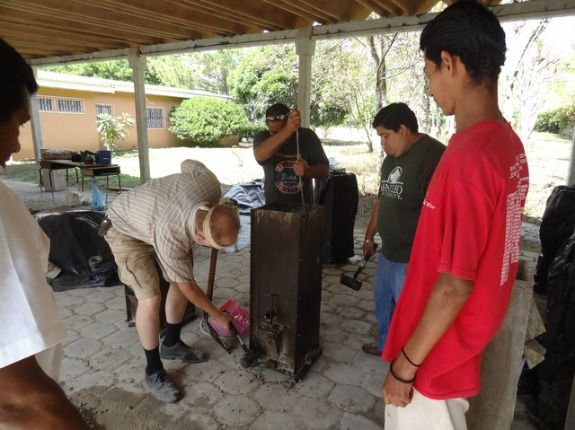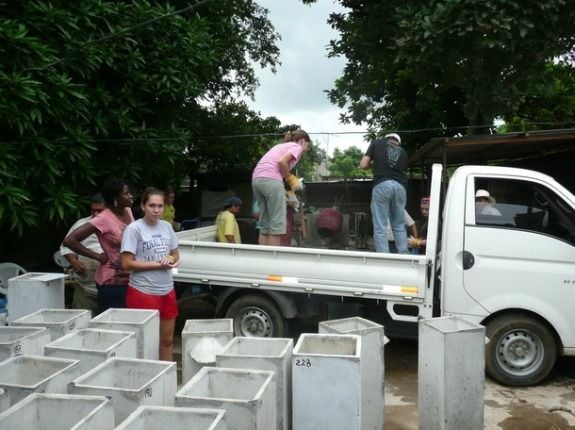Faces From Afar: Two Canadian Travelers Bring Love, Goodwill and Water Filters to the Needy
/https://tf-cmsv2-smithsonianmag-media.s3.amazonaws.com/filer/b7/21/b721fdda-8829-4351-8374-1b22bd2cf2db/friendswhocaremexicobig.jpg)
“Faces From Afar” is an ongoing series in which Off the Road profiles adventurous travelers exploring unique places or pursuing exotic passions. Know a globetrotter we should hear about? E-mail us at [email protected].
Give a man a glass of water, and you may quench his thirst. But teach him to build a biosand water filter using local materials and the simplest technology, and he'll have clean water for life at a cost of just $30.
Even better, Rod and Ingrid McCarroll, two retired Canadians, will pay half the cost or more if the 30 bucks is too steep. Sometimes it is. The McCarrolls, of Calgary, Alberta, have been traveling the world for 12 years in some of the most impoverished communities with the goal of bringing clean water to millions. They have worked through their own nonprofit organization, Friends Who Care International, in rural India, Mexico, Honduras and Guatemala. Last year, they spent six months in Nicaragua alone. Just two weeks ago, they arrived in Ecuador.
"We hope to provide clean water for 20 million people," Rod told me at the Hostal El Taxo in Quito, where we met by chance in the dining room. "It's estimated that 1.2 billion people now don't have clean water for drinking or cooking. The problem is, the world is growing faster than we're able to help."

The biosand water filter that is the main feature of the McCarrolls' work is a relatively simple thing. Invented in the 1990s by David Manz, an environmental engineering professor at the University of Calgary, the contraption is composed of carefully selected and treated sand and gravel, as well as a layer of iron nails, strategically layered in a four-foot-tall concrete casing. The setup weighs more than 200 pounds, making it too heavy to steal. Maintenance is easy, requiring simply scooping the mucky top water from the gravel layer every few months. Being too simple to experience serious mechanical breakdowns, the water filter all but guarantees a family clean water for life. Tap, pond or river water is poured into the gravel, and at a rate of one liter per 80 seconds, pure water emerges from the spout. The filter removes 99.5 percent of bacteria, viruses and protozoa, according to Rod, as well as 100 percent of parasites and 100 percent of arsenic—which bonds to the iron oxide molecules of the rusting nails and becomes unable to travel through the filter. Currently, the McCarrolls are in the rural mountainous regions surrounding Cuenca—Ecuador's third-largest city—working with local contacts and community leaders to teach them how to build the filters. Arsenic, Rod says, contaminates much of the region's water—a serious problem that could be solved as easily as the filter is simple.
Rod stresses that he and Ingrid are not just delivering clean water to one family at a time. Rather, they are teaching others—especially community leaders—to build biosand water filters and to teach the trick to others. By this means, the snowball effect seems already to have kicked in. While the McCarrolls have worked in just half a dozen countries, Rod says that clean water now trickles from half a million biosand water filters in 75 countries.

Apart from clean water, the McCarrolls have also worked to bring sustainable, off-the-grid electricity to the needy through another Canadian nonprofit called Light Up the World. Living in literal darkness, Rod says, means living in intellectual and spiritual darkness, too—as people cannot educate themselves if they return from work to a home too dim to read in.
But the McCarrolls have another objective, too, which leads them through more figurative realms of light and darkness: They are Christian missionaries. This is a more latent, secondary element of their work. Clean water and electricity come first, and religion follows. It may take 30 minutes of chatting with the pair even to discover their spiritual concerns, yet along with biosand water filters, they are indeed missionaries, encouraging those who accept their help to also adopt Christianity.
"If you go around the world and tell starving people that God loves them, it's hogwash," Ingrid said. "It means nothing. But if you give them something, then they see that they really do have friends."
Rod says the interest in dispensing Christian ideals goes hand in hand with having clean water, electricity and basic sanitary conditions. He says, too, that religious conversion is not a main objective—but that it doesn't hurt to make Hindus into Christians. The caste system, outlawed in India yet persisting through tradition, plagues much of the Hindu world—especially India. It relegates people born as untouchables to a life of poverty and filth—and with contaminated drinking water to boot, Rod points out.
"We're just trying to help remove them from this darkness," he explains. "But there are 600,000 villages in India, and many of them don't want anything to do with missionaries. So how do we get in?"
The biosand water filter. Given to the needy and bearing with it the heavy scent of Christianity (the McCarrolls may prompt prayer circles with families before they depart), "the water filter," Rod says, "serves as a 24/7 missionary."
Rod is 71 years old. Ingrid is 70. When she was a child, she barely escaped from East Germany before the Berlin Wall went up. Her family had been torn apart during the turmoil of war, but they managed to reconvene with the help of the Red Cross in Austria in 1945. Ingrid and Rod met and married 46 years ago. Upon retiring, they determined not to kick up their feet between rounds of golf and luxury vacation cruises.
"We decided that we'd done well, and we wanted to give back," Ingrid said.
After learning about Manz's biosand water filter in the late 1990s and growing efforts to dispense the invention around the world, the McCarrolls saw their opportunity to help the world's unfortunate. They worked at first with the organization CAWST (Centre for Affordable Water and Sanitation Technology), which was led by Camille Dow Baker, a former oil development executive striving to reform her career. Once the McCarrolls had learned the ropes, they established Friends Who Care International in 2001, and they have divided their time between Calgary and the wider world ever since.

/https://tf-cmsv2-smithsonianmag-media.s3.amazonaws.com/accounts/headshot/Off-Road-alastair-bland-240.jpg)
/https://tf-cmsv2-smithsonianmag-media.s3.amazonaws.com/accounts/headshot/Off-Road-alastair-bland-240.jpg)